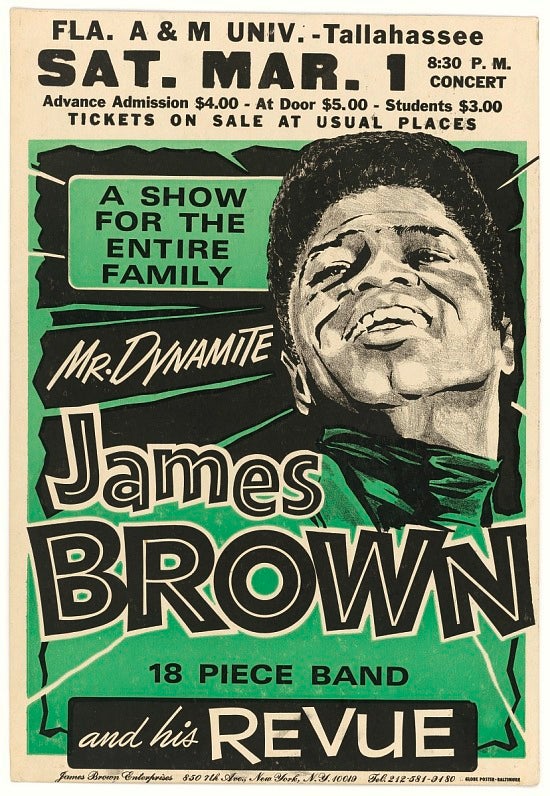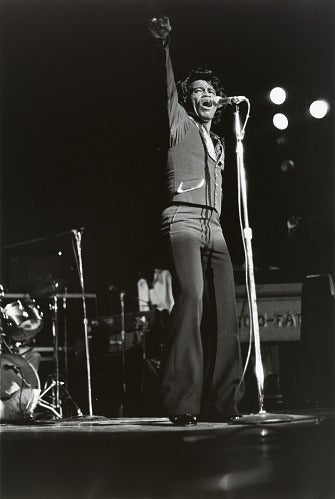Even though the Godfather of Soul, James Brown, was very proud of his Augusta heritage, it took a long time for Augusta to fully embrace him and his legacy. He finally got a statue in his honor in 2005, just a year before he died.
In the 1980s, James Brown could still fill arenas worldwide with his high energy stage act; but despite having a host of Hollywood stars show up at his birthday party concert in Augusta, the show was anything but “standing room only.”
Rather than playing James Brown’s music, local Augusta disc jockeys were on-air riffing-off on Eddie Murphy’s SNL now classic comic portrayal of Mr. Brown hosting a “Celebrity Hot Tub” program.
“Hot tub,uh, ahw, Hah! Hey! Gonna get in the hot tub, good god!”

In Augusta, Brown’s two brushes with the law and his unflattering mugshot made him the butt of jokes and local Augustans seemed to forget the incredible legacy of the ‘Hardest Working Man in Show Business;’ a boy that rose from poverty on the streets of Augusta and turned an innate talent into an artistic empire.
James Brown is credited with creating an entire genre of popular music, a feat not paralleled by any musical artist, from Beethoven to The Beatles or Bach to Bowie.
Also, Brown remains the most sampled artist in music history, meaning a lot of time you are hearing a Brown backbeat or entire musical phrase without even knowing it,
However, it seems people have a lot more respect and reverence for the cultural icon who never forgot his roots, and most music historians say, “it’s about time!”
Funk music, or some element of it is prevalent in the majority of music produced today; it is sampled for rap songs, used in commercials, has spawned several sub-genres within rock, hip hop and rhythm and blues and continues to inspire upcoming artists to try and create the “perfect groove.”
“Every musician, singer, group who did Funk, in any form, got it from Brown. He birthed it,” says the Godfather’s daughter Deanna Brown Thomas who manages her father’s charitable foundation and is the founder of the James Brown Academy of Musik Pupils, (JAMP).
Rock and roll was created from a mashup of gospel, folk and jazz. The country genre combined everything from Appalachian folk and bluegrass to Lousinana blues, BeBop was just gospel blended with Jazz minus the long improvisations and scat singing and punk emerged as a three-chord backlash against convention, but it has its roots in compositions by people like Buddy Holly.
Funk is its own creation entirely, something that was uniquely crafted to satisfy what Brown heard in his own ear and was captured on vinyl by artists from Pink Floyd, “Another Brick in the Wall, Pt.2” to Daft Punk’s “Get Lucky” and influenced David Bowie from the “Fame” era throughout the rest of his career.

Rather than treat the drummer and bassist as merely the supporting cast, keeping the band in time and on key, funk music places an emphasis on the rhythm section creating a forward motion in the music that makes people want to dance. British band Queen picked up on this with their international smash hit “Another One Bites the Dust,” where the bass guitar guides the entire song and a sparse loop recording of the drums drives a relentless beat.
Unlike jazz, which relies heavily of improvisation, funk has to be timed down to the millisecond. Brown’s interactions with the “Cape Man” were highly choreographed musical interludes; the ‘Hardest Working Man in Show Business’ would literally give musical cues and keep the beat with his body movements. This was something that Michael Jackson was on record as saying that he tried to emulate while on stage with his band.
It is true that Brown would issue “fines” to his band members who accidentally took a step off the beat and caused a ripple of confusion.
Brown also had the artistic maturity, combined with his pride at being a self-made man, to write lyrics that strayed from the “I Wanna Hold Your Hand” or “Stop! In the Name of Love” recipe of a hit and released socially conscience material long before Marvin Gaye, U2, Bruce Springsteen, Prince, Madonna, Lady Gaga or any of the current crop that wears their social concerns on their sleeve and began infusing their pop songs with something other than “Where’s the Party?”
That last song cited and recorded by Madonna has a drum beat straight out of the mind of James Brown.
Some music purists overseas were puzzled as to why famed tenor Luciano Pavarotti would partner with Brown on “This is a Man’s World,” until they heard the live results of the pairing where the poor little Black boy from Augusta gave a spine tingling performance in front of an enthusiastic crowd more accustomed to hearing Puccini performed in perfect pitch.
Classical music critic and self described “cultural maven” Tom Telcholz was one of the many critics that were bowled over by the performance.
“Brown’s performance is not about his staged theatrics, not about his dancing, not even really about Brown’s trademark grunts and growls. This is about singing and getting the song across,” Teicholz wrote.

Another thing that Thomas says was of major importance to Brown was getting the meaning of his music across without using profanity.
The song “Sex Machine” will make you want to get sweaty on the dance floor, but there is nothing overtly sexual in the lyrics themselves, unless the listener crafts it in their own mind. The same goes with songs that Brown wrote dealing with civil rights; he penned the phrase, “say it loud, I’m black and I’m proud,” but, the song features innocent children singing the chorus to remove any mistaken idea that the song could be about militancy.
James Brown used no form of profanity in his lyrics and nowhere throughout his entire discography, spanning decades, is the “N-word” or a variation of it used.
“He felt his music was a gift from God. He was not going to treat that gift with profanity, nor did he approve of any music by artists who wanted to sample his music but used profanity,” Thomas said.
Brown also had a sense of humor and didn’t mind parodying himself. He famously played a dancing minister in “The Blue Brothers,” appeared in Japanese miso soup commercials and even was on a local Augusta commercial, portraying a judge for a friend who owned a business in Augusta.
…And that is something you may not have known.
Scott Hudson is the Senior Investigative Reporter and Editorial Page Editor for The Augusta Press. Reach him at scott@theaugustapress.com











